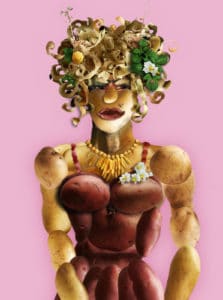An ancient melody floats, crackles and drones through the town hall of Aarhus, Denmark. The city is close to being European Capital of Culture. That is why we hear the same song at the handover ceremony as when it was launched on 21 January. Then Aarhus celebrated the start of Aarhus, European Capital of Culture and thundered 'Jeg drømte mig en drøm i nat' through the Aarhus streets.
Heads of Aarhus' political and cultural life look on smiling as the #Aarhus2017 bobos appreciate the past cultural year. Mayor Jacob Bundsgaard mentions the number of overnight stays and the well-hit city branding as highlights. The CEO of #Aarhus2017, Rebecca Matthews, is still glowing from all the exhibitions, performances and projects that 2017 produced. But above all, the resulting contacts are most important to her.
Then came the handover of the relay baton. In this case, two black stone sculptures with leaden Nordic appearance. The moment for the new twin capitals, Valletta and Leeuwarden, to give a shot in the arm.
Farmers, citizens, outdoorsmen?
Whereas Valletta explicitly opts for the city as a booster for the arts, Leeuwarden opts for the connection between city and countryside - just as Aarhus did. Forty per cent of all cultural projects take place in Leeuwarden, but the remaining sixty per cent are spread all over Friesland.
In their infectious duo presentation, Claudia Woolgar (Cultural Producer) and Jelle Burggraaf (Head European Affairs) highlight a few highlights from the sixty-plus 'big' events that await Leeuwarden and Friesland.
Those big events (often) aim for an international audience and are concentrated in Leeuwarden, such as the (already ongoing) Mata Hari exhibition, or the just-real giants of Royal de Luxe that are coming to make Leeuwarden unsafe in August. But also in Harlingen, the Tall Ships Races, and in Drachten, or Dr8888. There, Dada and De Stijl temporarily take over the city.
Free urination
Most of #Leeuwarden2018's small events and projects stem from 'Iepen Mienskip' or Open Community. Grassroots, in good Dutch. Groups and individuals from the Frisian community submitted their ideas. Two of them give an idea of the spirit of #Leeuwarden2018. These are Free to Pee and Poetic Potatoes.
Free to Pee is the stunningly simple solution to a well-known festival problem: the lack of public toilets. Instead of additional toilets at strategic locations around the city, the festival makes use of those already present. Namely those in the homes of city residents. Individuals in Leeuwarden can use a 'Free to Pee' sticker on their door to let visitors know they can use their toilets. Down with the Dixis!
Potato different
When preparations for Leeuwarden 2018 started in 2012, farmer's wife Froukje de Jong asked the organisers: 'Are you aware that there is a long-standing link between Malta and Friesland?' The Maltese potato, known to inveterate potato eaters as 'the' new potato, is indeed from Malta. But the planting material for the potato comes from Friesland - from Het Bildt, to be precise. And it has been so for 160 years.
In the International Year of the Potato 2008, Frisian potato growers organised De Bildt Potato Weeks: an art festival loosely draped around the potato. In 2012, in addition to the existing, agricultural links, a cultural link between Malta and Friesland emerged. In fact, Valletta and Leeuwarden were then chosen as European Capital of Culture (ECOC). Both are also bilingual cities. Besides English and Dutch, Malti and Frisian are official languages. This gave the potato festival, thanks to initiator farmer Froukje de Jong, a new dimension: Poetic Potato.
Since autumn 2014, ten Frisian poems have travelled to Malta every year along with the seed potatoes. And since spring 2015, ten Maltese poems have been travelling back with the new potatoes every year.
As a preliminary highlight, a book of the collected poems will be released in spring 2018. Parallel to the poetic project is a school project. In it, pupils from Maltese and Frisian schools also write poems in all four official languages. But they also learn more about Malta, Friesland, agriculture and food. And so minority languages, food studies, agriculture and art come together in an unexpected combination. What's not to like?

Volunteers, the lubricant for culture
One of the things that did complicate #Aarhus2017 at times was the number of volunteers. At first glance, this was not so visible because the bright-orange jackets could be found everywhere during events. For example on the closing night, 9 December. In the most obscure places, volunteers stood with torches in the freezing night to assist the crowds that had flocked and warn them about the slippery pavement.
However, in large events that required more time and commitment, the numbers were not met. The open-air performance Røde Orm, for instance, involved far fewer extras. As a result, the battle scenes looked a lot less massive and impressive than planned. The stakes were also high: almost a year of practising and learning swordsmanship, and playing almost every night throughout June.
At #Leeuwarden 2018, they are not so afraid of that. "We inquired with all the participants, and they said they actually had their act together pretty well," says CEO Tjeerd van Bekkum. Nevertheless, the organisation has set up an on-call team of volunteers, which can assist across the province if the need suddenly arises.
Approach to culture and work
Van Bekkum mentions another, special aspect of the volunteer coordination in #Leeuwarden2018: a number of volunteers are long-term unemployed. Under the wings of welfare organisation Wellzo, they get a push towards the labour market by doing volunteer work as a run-up.
But it is not so far. On Friday 26 January, #Leeuwarden2018 kicks off - across the province. All museums will be open that evening, and with bell chimes, the new cultural year begins. On Saturday 27 January, Leeuwarden takes centre stage . That's when the city turns into a buffet of cultural experiences, scheduled for 2018.
